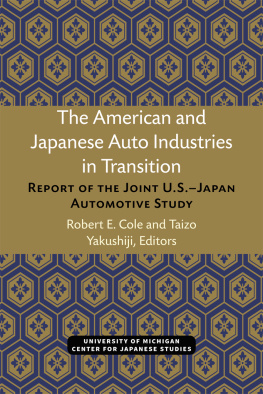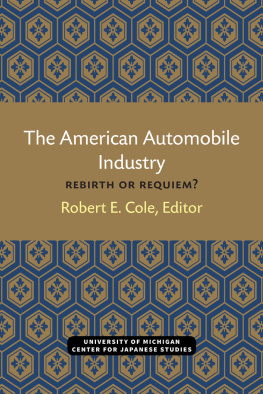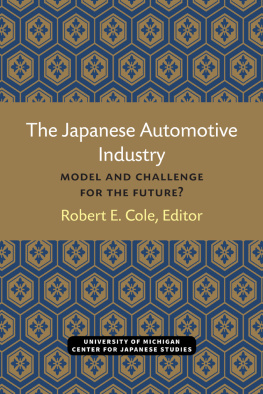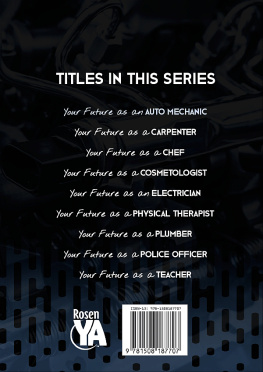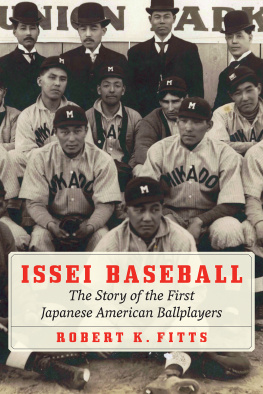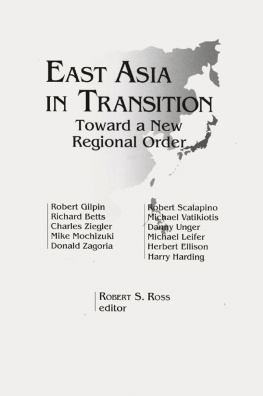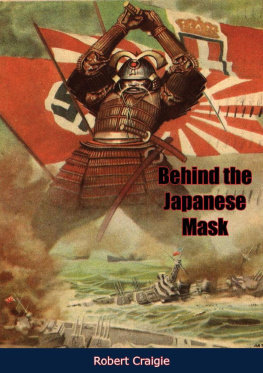The American and Japanese
Auto Industries in Transition
The American and Japanese
Auto Industries in Transition
Report of the Joint U.S.-Japan Automotive Study
edited by
Robert E. Cole
and
Taizo Yakushiji
conducted under the general direction
of research chairmen
Paul W. McCracken
and
Keichi Oshima
Ann Arbor
Center for Japanese Studies
The University of Michigan
Tokyo
Technova Inc.
1984
Open access edition funded by the National Endowment for the Humanities/Andrew W. Mellon Foundation Humanities Open Book Program.
Copyright 1984
Center for Japanese Studies
The University of Michigan
108 Lane Hall
Ann Arbor, MI 48109
and
Technova Inc.
13th Floor, Fukoku Seimei Building
2-2 Uchisaiwai-cho, 2-chome
Chiyoda-ku, Tokyo 100
Japan
All rights reserved
Cover Design by Carrie Di Lorenzo
Calligraphy by Shunichi Kato
Library of Congress Cataloging in Publication Data
Joint U.S.-Japan Automotive Study.
The American and Japanese auto industries in transition. Includes bibliographical references.
1. Automobile industry and tradeUnited States.
2. Automobile industry and tradeJapan. I. Cole, Robert E. II. Yakushiji, Taizo, 1944- . III. Title.
HD9710.U52J64 1984 338.4762920952 84-5814
ISBN 0-939512-20-3
Printed in the United States of America
ISBN 978-0-939512-28-7 (paper)
ISBN 978-0-472-88001-0 (ebook)
ISBN 978-0-472-90205-7 (open access)
The text of this book is licensed under a Creative Commons Attribution-NonCommercial-NoDerivatives 4.0 International License: https://creativecommons.org/licenses/by-nc-nd/4.0/
Contents
.
In the Spring of 1980, the prospects for the U.S. auto industry stood at low ebb, and there were rapidly growing trade frictions between Japan and the United States. At that time, a number of us initiated a set of private discussions that led to the formal establishment of the Joint U.S.-Japan Automotive Study in September 1980.
At the time of this writing, conditions have once again changed, and the sighs of collective relief can be heard widely throughout the respective auto industries. That the situation changed so rapidly in such a short time, however, should make us mindful that the future holds little promise of tranquility or ease of predictability.
Paul W. McCracken
Keichi Oshima
Research Chairmen
This report was prepared for the Policy Board by the U.S. and Japanese research staffs of the Joint U.S.-Japan Automotive Study under the general direction of Professors Paul W. McCracken and Keichi Oshima, with research operations organized and coordinated by Robert E. Cole on the U.S. side, in close communication with Taizo Yakushiji on the Japanese side. The range of views within the Policy Board, representing widely varying backgrounds, perspectives, and interests, is great. The report is not what any one member of the Policy Board would have written. Therefore, each member reserves the right to his own views on specific matters. The sponsors listed on a subsequent page have joined the study with the intent to promote understanding and open dialogue on the subject of the U.S. and Japanese automotive industries. The report, while taking sponsors views into account, does not necessarily reflect their individual or organizational views of issues covered in the report. Finally, individual researchers associated with the project do not themselves necessarily agree with all statements in the report. Notwithstanding, there was a substantial measure of consensus within the Policy Board and among the research scholars as to the nature of the problems and policy options of the auto industry. Therefore, we commend this report, produced by scholars in both countries, to the general public.
The Policy Board of the
Joint U.S.-Japan Automotive Study
Shoichi AKAZAWA
President
Japan External Trade Organization
David E. COLE
Director
Office for the Study of Automotive Transportation
The University of Michigan
Robert E. COLE
U.S. Project Director
Joint U.S.-Japan Automotive Study
The University of Michigan
Donald F. EPHLIN
Vice President and Director
National General Motors Department
United Automobile Workers
R. Eugene GOODSON
Group Vice President
Automotive Products Group
Hoover Universal, Inc.
Takashi HOSOMI
President
Overseas Economic Cooperation Fund
Robert S. INGERSOLL
Chairman
The Japan Society
Former U.S. Ambassador to Japan
Motoo KAJI
Professor of Economics
The University of Tokyo
Julius L. KATZ
Chairman and Chief Executive Officer
ACLI International Commodity Services, Inc.
James KNISTER
Vice President
Donnelly Mirrors
Paul W. McCRACKEN
Edmund Ezra Day Distinguished University Professor of Business Administration
The University of Michigan
Keichi OSHIMA
Professor Emeritus, Engineering
The University of Tokyo
Fred G. SECREST
Consultant
Ford Motor Company
John SMITH, Jr.
Director
Worldwide Product Planning Group
General Motors Corporation
Minoru TOYODA
Chairman
Board of Directors
Technova Inc.
Shoichiro TOYODA
President
Toyota Motor Corporation
Nobuhiko USHIBA
Advisor
Ministry of Foreign Affairs
Former Japanese Ambassador to the United States
Shigenobu YAMAMOTO
Executive Vice Chairman
Toyota Motor Corporation
Yoshihisa YOKOYAMA
Executive Vice President
Nissan Motor Company, Ltd.
George BITTLINGMAYER
Assistant Professor of Business Administration
The University of Michigan
John CAMPBELL
Director
Center for Japanese Studies
The University of Michigan
David E. COLE
Director
Office for the Study of Automotive Transportation
The University of Michigan
Robert E. COLE
Professor of Sociology
The University of Michigan
Michael S. FLYNN
Associate Research Scientist
Joint U.S.-Japan Automotive Study
The University of Michigan
Mieko HANAEDA
Project Researcher
Technova Inc.
Lawrence. T. HARBECK
Associate Research Scientist
Office for the Study of Automotive Transportation
The University of Michigan
Richard P. HERVEY
Management Consultant and President
Sigma Associates
Masakazu IGUCHI
Professor of Mechanical Engineering for Production
The University of Tokyo
Motoo KAJI
Professor of Economics
The University of Tokyo
Fumio KODAMA
Associate Professor of System Engineering
The Saitama University
Jeffrey LIKER
Assistant Professor of Industrial and Operations Engineering
The University of Michigan
Paul W. McCRACKEN
Edmund Ezra Day Distinguished University Professor of Business Administration
The University of Michigan
Keichi OSHIMA
Professor Emeritus of Engineering
The University of Tokyo
Vladimir PUCIK
Assistant Professor of Business Administration
The University of Michigan
Haruo SHIMADA
Professor of Economics
Keio University
Robert J. THOMAS
Assistant Professor of Sociology
The University of Michigan
Adrian TSCHOEGL
Assistant Professor of Business Administration
The University of Michigan
Richard C. WILSON
Professor of Industrial Engineering
The University of Michigan

